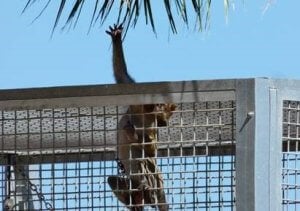Video Expose’ of Charles River-Backed Monkey Dealer Prompts PETA Warning to WHO
For Immediate Release:
September 11, 2023
Contact:
Tasgola Bruner 202-483-7382
PETA is calling on two global authorities—the World Health Organization (WHO) and the World Organisation for Animal Health (WOAH), which coordinate international activities together—to enforce global standards for preventing and controlling zoonotic pathogens in primates and crack down on the international monkey experimentation–supply pipeline. This follows a damning exposé published by Spanish animal protection group Abolición Vivisección revealing that Camarney—Europe’s largest supplier of imported monkeys for experimentation, based in Spain—takes woefully inadequate measures to prevent the spread of diseases that are easily transmissible from monkeys to humans, including tuberculosis (TB).
PETA and Abolición Vivisección’s letter to the WOAH and the WHO, sent today, warns that enforcement of the WOAH Terrestrial Code—global standards designed to improve the safety of the international trade in animals—is urgently needed.
Abolición Vivisección’s exposé reveals that macaques’ health certificates appear to have been erased from Camarney’s database and that the facility fails to record animals’ causes of death or necropsy results. Inspectors were denied access to some areas because the site didn’t have monkeys’ current TB test results, and its reportedly poorly secured cages posed the risk that monkeys could become injured or escape.
Camarney is owned by Noveprim Ltd. (a Mauritian company), and Charles River Laboratories owns 49% of Noveprim’s shares. Charles River is currently under federal civil and criminal investigation for possible violations of laws governing the importation of monkeys into the U.S. The U.S. Securities and Exchange Commission also recently launched an investigation into Charles River’s procurement of monkeys from Asia.

A caged monkey at Camarney reaches for a palm frond. Photo credit: Abolición Vivisección
Most of the monkeys at Camarney are imported from Mauritius, where 200 monkeys were killed as a result of a TB outbreak in May. Monkeys imported from that country were recently found to be infected with TB in a Michigan laboratory where two people tested positive for TB and were then referred for treatment.
The experimentation industry ships wild-caught, endangered long-tailed macaques globally, despite WOAH Terrestrial Code Article 7.8.7, which states that endangered species should be used for experiments only in “exceptional circumstances,” “[a]nimals should be acquired legally,” and “[t]he use of wild caught nonhuman primates is strongly discouraged.”
PETA—whose motto reads, in part, that “animals are not ours to experiment on”—opposes speciesism, a human-supremacist worldview. For more information, please visit PETA.org, listen to The PETA Podcast, or follow the group on X (formerly Twitter), Facebook, or Instagram.


